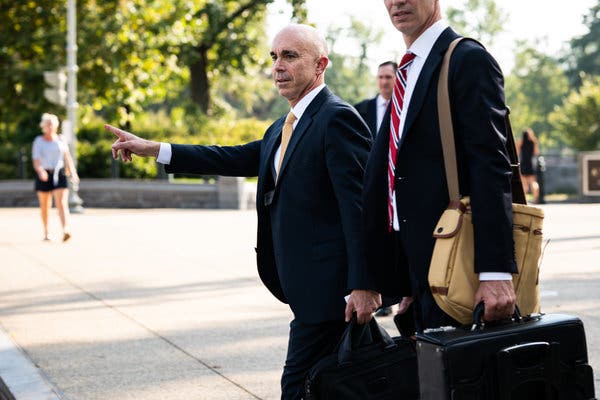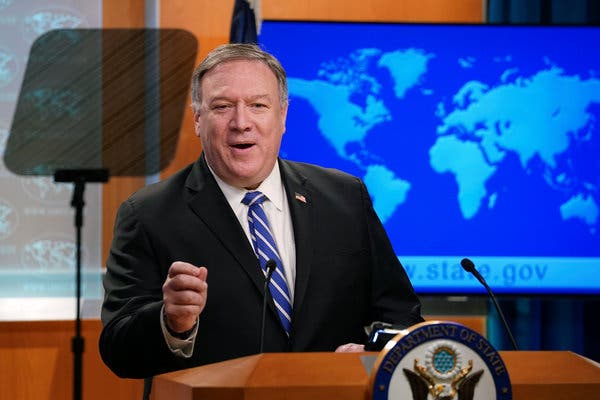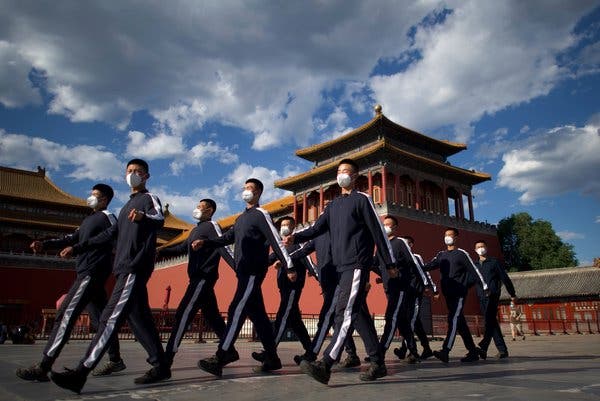Advertisement
The lawmakers said Steve Linick, the State Department’s inspector general, had opened an investigation into Secretary of State Mike Pompeo’s conduct.

WASHINGTON — Secretary of State Mike Pompeo urged President Trump to fire the official responsible for fighting waste and fraud in his department, a White House official said Saturday, a recommendation certain to come under scrutiny after congressional Democrats opened an investigation into what they said “may be an act of illegal retaliation.”
Mr. Trump told Speaker Nancy Pelosi late Friday night that he was ousting Steve A. Linick, who led the office of the inspector general at the State Department, and replacing him with an ambassador with close ties to Vice President Mike Pence.
Representative Eliot L. Engel, Democrat of New York and the chairman of the House Committee on Foreign Affairs, immediately called the decision to remove Mr. Linick an “outrageous act” meant to protect Mr. Pompeo from accountability.
By Saturday, Mr. Engel and Senator Bob Menendez of New Jersey, the top Democrat on the Senate Foreign Relations Committee, had opened an investigation into Mr. Linick’s removal, citing a pattern of “politically motivated firing of inspectors general.”
In letters to the White House, the State Department and Mr. Linick, the two Democrats wrote that they believed Mr. Linick had opened an investigation into wrongdoing by Mr. Pompeo and that Mr. Pompeo had responded by recommending that Mr. Linick be fired. The lawmakers did not provide any more details, but a Democratic aide said that Mr. Linick had been looking into whether Mr. Pompeo improperly used a political appointee at the State Department to perform personal tasks for him and his wife.
A White House official, speaking on the condition on anonymity, confirmed on Saturday that Mr. Pompeo had recommended Mr. Linick’s removal and said that Mr. Trump had agreed. A spokeswoman for Mr. Pompeo did not immediately respond to an email seeking comment.
“Such an action, transparently designed to protect Secretary Pompeo from personal accountability, would undermine the foundation of our democratic institutions and may be an illegal act of retaliation,” the lawmakers wrote.
Since starting his current job in April 2018, Mr. Pompeo has come under growing public scrutiny for what critics say is his use of the State Department’s resources for personal endeavors. Mr. Menendez has called for Mr. Pompeo to explain how he can justify frequent trips to Kansas, his adopted home state, using State Department funds and aircraft. He has brought his wife, Susan Pompeo, on many trips abroad, telling others she is a “force multiplier” for him. And CNN reported last year that congressional officials were looking at potential misuse of diplomatic security personnel for personal errands. That did not result in the opening of a formal inquiry.
In their letters, Mr. Engel and Mr. Menendez requested that the administration turn over records and information related to the firing of Mr. Linick as well as “records of all I.G. investigations involving the Office of the Secretary that were open, pending, or incomplete at the time of Mr. Linick’s firing.”
Senator Mitt Romney of Utah, one of the few congressional Republicans who have been publicly critical of the president, denounced Mr. Linick’s dismissal Saturday evening.
“The firings of multiple Inspectors General is unprecedented; doing so without good cause chills the independence essential to their purpose,” Mr. Romney said on Twitter. “It is a threat to accountable democracy and a fissure in the constitutional balance of power.”
Few Republicans have commented on the move. Senator Charles E. Grassley of Iowa, who in the past has made a point of defending inspectors general, said in a statement that “a general lack of confidence simply is not sufficient detail to satisfy Congress.”
Mr. Trump’s decision to remove Mr. Linick is the latest in a series of ousters aimed at inspectors general who the president and his allies believe are opposed to his agenda, upending the traditional independence of the internal watchdog agencies.
On May 1, even as the coronavirus pandemic continued to ravage the country, Mr. Trump moved to oust Christi A. Grimm, the principal deputy inspector general for the Department of Health and Human Services, whose office had issued a report revealing the dire state of the nation’s response to the pathogen. He has also taken steps to remove two other inspectors general.
A month earlier, the president ousted Michael K. Atkinson, the inspector general for the intelligence community, who had infuriated the president by insisting on telling lawmakers about a whistle-blower complaint that ultimately prompted impeachment proceedings.
The president also took steps to remove Glenn A. Fine, who has been the acting inspector general for the Defense Department since before Mr. Trump took office, so that he could not be installed as the leader of an oversight panel intended to keep tabs on how the Trump administration spends trillions of dollars in pandemic relief approved by Congress.
In his letter informing Ms. Pelosi about Mr. Linick’s removal, which was obtained by The New York Times, Mr. Trump wrote that “it is vital that I have the fullest confidence in the appointees serving as Inspectors General.”
“That is no longer the case with regard to this Inspector General,” the president added.
Under law, the administration must notify Congress 30 days before formally terminating an inspector general. Mr. Linick is expected to leave his post after that period.
Mr. Linick was spotlighted during the impeachment inquiry when he requested an urgent meeting with congressional staff members to give them copies of documents related to the State Department and Ukraine, signaling that the documents could be relevant to the House inquiry into whether President Trump pressured Ukraine to investigate former Vice President Joseph R. Biden Jr. and his son Hunter Biden. The documents — a record of contacts between Rudolph W. Giuliani, the president’s personal lawyer, and Ukrainian prosecutors, as well as accounts of Ukrainian law enforcement proceedings — turned out to be largely inconsequential.
Two other investigations spearheaded by Mr. Linick’s office created friction among senior political appointees at the State Department. The office said in November that it had found that appointees at the agency, when it was led by Rex W. Tillerson, had retaliated against a career civil servant, Sahar Nowrouzzadeh, because of her Iranian-American ethnicity and a perception that she held political views different from those of top Trump officials. Brian H. Hook, then the head of the office of policy planning, where Ms. Nowrouzzadeh worked, was scrutinized in that inquiry. Mr. Hook is now the special representative for Iran and works closely with Mr. Pompeo.
Mr. Linick’s office also found in August that two political appointees in the Bureau of International Organization Affairs had harassed career employees based on claims that the employees were “disloyal” based on their perceived political views.
His ouster came hours after the Democratic-led House had passed a $3 trillion coronavirus relief measure that included a provision designed to provide additional legal protections for inspectors general. The overall proposal has no chance of becoming law, with near-unanimous Republican opposition.
Edward Wong contributed reporting.




